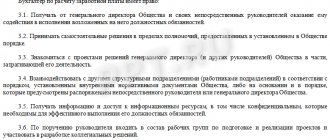Professional Standards for Accountants 2021
The Institute of Professional Accountants of the Russian Federation developed and the Ministry of Labor approved the current Professional Accountant Standard 309 (Order No. 1061n of December 22, 2014). The document contains the basic requirements for the qualifications, knowledge, education, experience of accounting employees, and also lists the labor functions of such employees. The requirements are specified separately for ordinary employees and managers, that is, chief accountants or deputies.
Initially, the Order was not mandatory and was advisory in nature. The provisions of this regulatory act were used in the process of coordinating the work of the accounting department of enterprises, in order to test the knowledge of personnel and determine the functionality of positions. However, in 2021, the Ministry of Labor began to develop additions to the professional standard for accountants; the project can be downloaded on the official website of the Ministry of Labor. What changes are being discussed?
First of all, qualification levels have been expanded. Levels 7 and 8 will appear. Labor functions have been expanded accordingly - conducting financial and tax analysis, generating reports on EP (separate divisions), organizing and planning various business processes, etc. But at the moment, the updated version of the Standard has not yet been approved, so refer it can only be accessed in the old edition (dated January 23, 2015).
Professional standard for chief accountant from 2021
Document structure
The professional standard consists of three sections:
| Information block | Content |
| 1 | The first block of data is devoted to general information about the type of professional activity. |
| 2 | The second information block provides a description of the labor functions that the head of the accounting service must perform. In this part, the professional standard of the chief accountant displays a list of generalized work functions that correspond to a specific set of codes and a certain level of qualifications. The degree of qualification can be of two types - level 5 and level 6. |
| 3 | The third section provides a detailed explanation of labor functions. This part separately sets out the qualification requirements for the chief accountant and the accountant. The document describes in detail the criteria for selecting specialists based on the level of education and the work experience of the applicants in the chosen area of activity. Job responsibilities should be distributed among employees of the accounting department with reference to the categories of labor functions and the minimum skills and special knowledge necessary for their implementation. |
Professional standards for accountants from July 1, 2021
In 2021, the Professional Accountant Standard, approved by the Government of the Russian Federation in 2015, will most likely be updated. As before, the norms of this document are not binding for all organizations. Who must comply with these requirements? For the answer, let's turn to clause 4 of the statute. 7 of Law No. 402-FZ of December 6, 2011. It says that professional requirements are imposed on the chief accountants (or persons responsible for accounting) of the following institutions:
- Open joint stock companies, except for credit structures.
- NPF.
- Insurance companies.
- AIF and Management Mutual Fund.
- Other entities that have securities admitted to organized trading, except for credit institutions.
- Management bodies of extra-budgetary state and territorial extra-budgetary funds.
Both Law No. 402-FZ and the Professional Standard for Accountants 2018 establish the need for higher education and a certain work experience for chief accountants of designated types of enterprises. But if the Law approves general requirements for education and experience, the Professional Standard of an Accountant, you can download the document at the end of the article, which explains in detail the job functions, knowledge and skills. The requirements are given for two professions - an ordinary accountant and a chief accountant (or his deputy). What are they?
Testing Features
The work of an accountant requires a wide range of knowledge. But, since this is not a standard set of operations for all such specialists, testing in each case can be designed differently. For example, if this is the position of an assistant accountant or an accountant for primary documentation, the requirements are minimal. The test will also not contain any very complex tasks and tasks. If this is a vacancy for the position of chief accountant, the testing will include several modules and its complexity will be much higher.
Even if this is an online test, or on paper, given at home, you should not hope that you can quickly find the answers on the Internet. Employers provide this option and specifically create tasks that are not available online. Since accounting allows you to create unique problems and situations, test writers take advantage of this to make it impossible to find answers to them in the public domain. If the test is taken online, there is a limited amount of time to complete it, and the candidate does not have the opportunity or time to look for answers.
In terms of time, the test can take from 20-30 minutes to 3 hours. It all depends on how complex it is and for whom exactly it is intended, for example, for a chief accountant or for an assistant accountant, for whom there are minimum requirements.
According to statistics, not all applicants manage to cope with the professional aptitude test. Most of them come to the conclusion that they will not be able to complete the tasks. Therefore, without completing all the work, they leave the interview, or close the test window if it is taken online. On average, out of 100 people, only 20 complete the task and submit the result. Of these, only 3-5 people perform it correctly. Therefore, despite the fact that there are many applicants on the labor market for these positions, there is a small percentage of specialists with the necessary knowledge and skills. And testing can significantly increase the efficiency of finding worthy, suitable candidates. Even if everything is done perfectly, this does not mean that the applicant is truly competent. Many people memorize standard wiring and prepare thoroughly. After successfully passing the test, they can conduct an additional conversation and ask oral questions regarding, for example, recent changes in legislation. Or they are asked to solve a seemingly standard problem, but with a catch associated specifically with these changes in the law.
Take the accounting test for free
Professional standard of an accountant - regulatory requirements
Starting from 2021, the professional standard of an accountant is mandatory for ordinary accountants of those organizations whose job descriptions indicate the relevant conditions. In particular, according to the Standard, for an ordinary, not chief, accountant, it is enough to have a secondary education or completed courses. Employment experience is limited to 3 years. In this case, work experience as an assistant to the chief accountant, as well as a cashier or controller will be suitable. Regarding labor skills, their list is limited to three categories:
- 1 – work with primary data (formation, checking for compliance with regulatory requirements, accounting).
- 2 – registration of documents and transactions in accounting registers.
- 3 – determination of final results for accounts by closing turnover.
Why is it important to control your accounting yourself?
With the strengthening of the role of regulatory authorities, the introduction of electronic document management and the availability of online access for tax authorities to current accounts and cash registers of organizations, incorrect accounting is fraught with audits, fines and other sanctions.
Sometimes, after the dismissal of an accountant, the manager suddenly finds out that the company’s accounting is in a deplorable state: the accounting documents are not sorted out or are missing, the figures in the statements are taken out of thin air, transactions are not posted to accounts. Restoring neglected accounting is a very labor-intensive process. In some cases, this is completely impossible to do. Errors and lack of documents during the first inspection will result in additional taxes, fines and penalties (Articles 120 and 122 of the Tax Code of the Russian Federation).
Counterparties will not deal with a company if it does not know how to draw up primary documents confirming the fact of carrying out income or expense business transactions (invoices, orders, instructions, etc.). An organization that cannot confirm VAT transactions when requested by the tax office will not inspire confidence in its partners.
Some accountants, in order to “earn money,” transfer transit amounts through the organization’s accounts or engage in cash transfers for strangers. For the use of fraudulent schemes, it is the head of the company who faces criminal prosecution (Articles 171, 174, 199, 199.2, 327 of the Criminal Code of the Russian Federation).
5 problems that will definitely arise if you don’t control your accounting:
- Difficulties with tax authorities: late submission of reports, non-payment of taxes, fines;
- Deterioration of relationships with partners: serious counterparties value their tax reputation and will not want to work with an organization in which accounting is carried out carelessly;
- Fraud with a current account and cash register: inappropriate expenses, theft, illegal cashing and transit of other people's funds;
- Continuing violations of primary documentation, which can remain in the shadows for a long time and “shoot” during a tax audit. This will lead to the most dire consequences for business: for example, a company may go bankrupt due to the inability to pay tax sanctions;
- Criminal prosecution of a leader by internal affairs bodies.
It should be remembered: if a company goes bankrupt and has tax debt due to the fault of its managers or participants, they may be subject to subsidiary liability (Article 3 of the Federal Law “On Limited Liability Companies” No. 14-FZ of 02/08/1998). Nowadays, increasingly, the tax debt of an LLC after bankruptcy is collected in court at the expense of the personal property of the director and founders.
The chief accountant of a small contracting company resigned due to health reasons immediately after receiving notification of a tax audit. The specialist taken in his place could not explain many aspects of accounting to the inspectors, since there was no order in the accounting department: some of the primary documents were missing, some were filled out with errors.
The result is that tax authorities did not accept a large number of transactions for accounting and assessed additional taxes, fines and penalties of more than 8 million rubles. For a company with an annual turnover of 5 million rubles, the amount was simply huge. Six months later, the tax inspectorate initiated bankruptcy of the organization. The owner lost his business and started everything from scratch.
The head of the company is responsible for errors in accounting: from fines and penalties to imprisonment
Professional standard of the chief accountant - regulatory requirements
Starting from 2021, the current Professional Standards for accountants necessarily apply to executives - chief accountants, as well as their deputies. Such workers must have only higher or secondary vocational education. And work experience depends on whether you have a degree or not. If you have completed university, 3 years of employment in relevant positions is sufficient; if not, a minimum of 5 years of work experience is required.
At the same time, the employer’s management has the right to hire employees without specialized education if they consider such a decision appropriate. The list of enterprises for which the chief accountant is required to have only a higher education has been approved by Stat. 7 of Law No. 402-FZ. There are 5 levels of labor categories:
- 1 – generation of accounting reports, including balance sheet, income statement and other forms.
- 2 – organization and maintenance of tax accounting in the company, including the development of accounting policies, registers, selection of depreciation methods, etc.
- 3 – internal control over accounting.
- 4 – preparation of consolidated reporting forms.
- 5 – development of financial analysis methods and their application in practice.
When are test results announced?
Everything is individual, depending on the specific company that organizes testing for applicants. Tests can be taken either directly in the office after the interview, or online even before the employer has met with the potential applicant. Often, after an interview, tests are given with them so that the applicant can complete them at home and send the result via email.
If tests are taken online, the results may be published immediately with the percentage of correct and incorrect answers. If the employer initially set certain parameters, the system can automatically report whether the test was passed and whether the required number of points was scored. In accordance with this, the applicant will immediately know whether he passes to the next stage or not. The most convenient format, because the applicant does not need to wait and be nervous when they call him back.
When testing takes place on the employer's premises or at home, the results are not immediately announced. Some employers report test results immediately. And if they refuse an applicant, they motivate this precisely by the fact that he did not pass the professional aptitude test. Others may simply refuse without explaining the reason in a standard form, and some do not give any feedback at all: neither in the form of a phone call, nor in the form of an email message. If the test is passed, a notification is received and the applicant is invited to the next stage, or to the application procedure itself.
If the employer still does not give feedback, you can, just in case, wait a week, call back and clarify the results, find out what decision was made. No need to be shy. This will allow you to remove the company from the waiting list and continue your search if the employer is not yet ready to invite you to an open vacancy.








